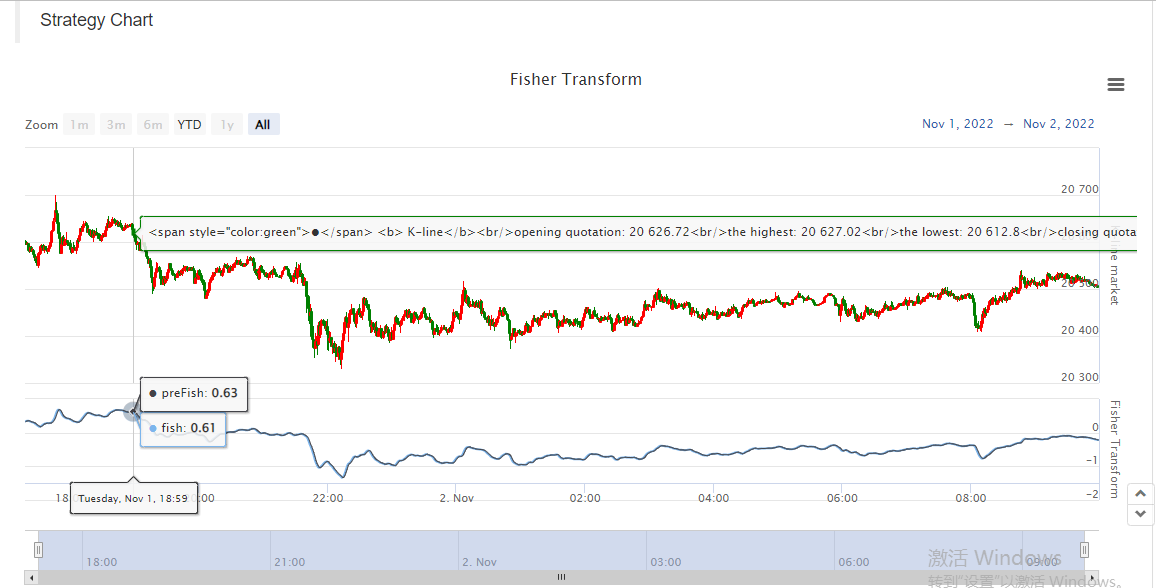JavaScript language implementation of Fisher indicators and drawing on FMZ
Author: FMZ~Lydia, Created: 2022-11-07 11:37:48, Updated: 2024-12-02 21:42:27
During the technical analysis of trading, traders analyze and study the stock price data as the data of normal distribution. However, the distribution of stock price data does not conform to the standard normal distribution. Fisher Transformation is a method that can transform price data into normal distribution. Fisher Transformation smooth the market data and eliminate some sharp small periodic oscillations. Trading signals can be sent by using the indicators of the current day and the previous day.
There are a lot contents about the Fisher Transformon Baidu, Zhihu, here we will not repeat.
Indicator algorithm:
- Mid-price today:
- Judge the calculation period, which can be 10 days. Calculate the highest and lowest price in the period:
```lowestLow = lowest price in the period```,```highestHigh = highest price in the period```.
- Define the price change parameter (the ```ratio``` is a constant between 0-1, for example, 0.5 or 0.33):

- Using the ```Fisher``` transformation on the price change parameter ```x```, the ```Fisher``` indicator is obtained:

### Implement the algorithm by using the JavaScript language
It is implemented step by step according to the indicator algorithm. It should be noted that the algorithm is an iterative algorithm. For ```preX``` and ```preFish```, they were set to 0 at the beginning. For ```Math Log``` is to find the logarithm based on the natural constant e. In addition, the above algorithm did not mention the correction of x, which I almost ignored when writing:
Correct the value of x, force it to be 0.999 if it is greater than 0.99. Same for that of less than -0.99.
if (x > 0.99) {
x = 0.999
} else if (x < -0.99) {
x = -0.999
}
The first time I saw the algorithm and indicators, I transplanted them according to the algorithm. I have not verified this implementation, and some who are interested in research can verify whether there are any errors. Thank you very much for pointing out the mistakes.
```Fisher Transform``` indicator algorithm source code:
```js
function getHighest(arr, period) {
if (arr.length == 0 || arr.length - period < 0) {
return null
}
var beginIndex = arr.length - period
var ret = arr[beginIndex].High
for (var i = 0 ; i < arr.length - 1 ; i++) {
if (arr[i + 1].High > ret) {
ret = arr[i + 1].High
}
}
return ret
}
function getLowest(arr, period) {
if (arr.length == 0 || arr.length - period < 0) {
return null
}
var beginIndex = arr.length - period
var ret = arr[beginIndex].Low
for (var i = 0 ; i < arr.length - 1 ; i++) {
if (arr[i + 1].Low < ret) {
ret = arr[i + 1].Low
}
}
return ret
}
function calcFisher(records, ratio, period) {
var preFish = 0
var preX = 0
var arrFish = []
// When the length of K-line is not enough to meet the period
if (records.length < period) {
for (var i = 0 ; i < records.length ; i++) {
arrFish.push(0)
}
return arrFish
}
// traverse the K-line
for (var i = 0 ; i < records.length ; i++) {
var fish = 0
var x = 0
var bar = records[i]
var mid = (bar.High + bar.Low) / 2
// When the current BAR is insufficient in period calculation
if (i < period - 1) {
fish = 0
preFish = 0
arrFish.push(fish)
continue
}
// Calculate the highest and lowest price in the period
var bars = []
for (var j = 0 ; j <= i ; j++) {
bars.push(records[j])
}
var lowestLow = getLowest(bars, period)
var highestHigh = getHighest(bars, period)
// price change parameters
x = ratio * 2 * ((mid - lowestLow) / (highestHigh - lowestLow) - 0.5) + (1 - ratio) * preX
if (x > 0.99) {
x = 0.999
} else if (x < -0.99) {
x = -0.999
}
preX = x
fish = 0.5 * Math.log((1 + x) / (1 - x)) + 0.5 * preFish
preFish = fish
arrFish.push(fish)
}
return arrFish
}
Drawing chart
It’s easy to draw on FMZ, Strategy Square: https://www.fmz.com/square has a large number of examples on it for reference, you can search them.
var cfg = { // The object used to initialize chart settings (i.e. chart settings)
plotOptions: {
candlestick: {
color: '#d75442', // color value
upColor: '#6ba583' // color value
}
},
title: { text: 'Fisher Transform'}, //title
subtitle: {text: ''}, //sub-title
plotOptions: {
candlestick: {
tooltip: {
pointFormat:
'<span style="color:{point.color}">\u25CF</span> <b> {series.name}</b><br/>' +
'opening quotation: {point.open}<br/>' +
'the highest: {point.high}<br/>' +
'the lowest: {point.low}<br/>' +
'closing quotation: {point.close}<br/>'
}
}
},
yAxis: [{
title: {
text: 'K-line market'
},
height: '70%',
lineWidth: 1
}, {
title: {
text: 'Fisher Transform'
},
top: '75%',
height: '30%',
offset: 0,
lineWidth: 1
}],
series: [//series
{
type: 'candlestick',
yAxis: 0,
name: 'K-line',
id: 'KLine',
// Control the candle color with downward trend
color: 'green',
lineColor: 'green',
// Control the candle color with upward trend
upColor: 'red',
upLineColor: 'red',
data: []
},{
type: 'line', // Set the current data series type as line
yAxis: 1, // The y-axis used as the y-axis with the index of 0 (a highcharts chart can have multiple y-axes, and the y-axis with the index of 0 is specified here)
showInLegend: true, //
name: 'fish', // Set it according to the parameter label passed in by the function
lineWidth: 1,
data: [], // Data items of data series
tooltip: { // Tooltip
valueDecimals: 2 // The decimal point of the value is reserved for 5 digits
}
},{
type: 'line', // Set the current data series type as line
yAxis: 1, // The y-axis used as the y-axis with the index of 0 (a highcharts chart can have multiple y-axes, and the y-axis with the index of 0 is specified here)
showInLegend: true, //
name: 'preFish', // Set it according to the parameter label passed in by the function
lineWidth: 1,
data: [], // Data items of data series
tooltip: { // Tooltip
valueDecimals: 2 // The decimal point of the value is reserved for 5 digits
}
}
]
}
var chart = Chart(cfg)
function main() {
var ts = 0
chart.reset()
while (true) {
var r = exchange.GetRecords()
var fisher = calcFisher(r, 0.33, 10)
if (!r || !fisher) {
Sleep(500)
continue
}
for (var i = 0; i < r.length; i++){
if (ts == r[i].Time) {
chart.add([0,[r[i].Time, r[i].Open, r[i].High, r[i].Low, r[i].Close], -1])
chart.add([1,[r[i].Time, fisher[i]], -1])
if (i - 1 >= 0) {
chart.add([2,[r[i].Time, fisher[i - 1]], -1])
}
}else if (ts < r[i].Time) {
chart.add([0,[r[i].Time, r[i].Open, r[i].High, r[i].Low, r[i].Close]])
chart.add([1,[r[i].Time, fisher[i]]])
if (i - 1 >= 0) {
chart.add([2,[r[i].Time, fisher[i - 1]]])
}
ts = r[i].Time
}
}
}
}

So it is very convenient to study data, display chart and design strategy on FMZ. Here we just demonstrated an example, you guys all are welcome to leave a message.
- Quantitative Practice of DEX Exchanges (2) -- Hyperliquid User Guide
- DEX exchange quantitative practices ((2) -- Hyperliquid user guide
- Quantitative Practice of DEX Exchanges (1) -- dYdX v4 User Guide
- Introduction to Lead-Lag Arbitrage in Cryptocurrency (3)
- DEX exchange quantitative practice ((1) -- dYdX v4 user guide
- Introduction to the Lead-Lag suite in digital currency (3)
- Introduction to Lead-Lag Arbitrage in Cryptocurrency (2)
- Introduction to the Lead-Lag suite in the digital currency (2)
- Discussion on External Signal Reception of FMZ Platform: A Complete Solution for Receiving Signals with Built-in Http Service in Strategy
- Discussing FMZ platform external signal reception: a complete set of strategies for the reception of signals from built-in HTTP services
- Introduction to Lead-Lag Arbitrage in Cryptocurrency (1)
- Digital Currency Futures Double-EMA Turning Point Strategy (Tutorial)
- Subscribe New Shares Strategy for Digital Currency Spot (Tutorial)
- Realize an idea with 60 Lines of Code -- Contract Bottom Fishing Strategy
- Digital Currency Spot Multi-variety Double-EMA Strategy (Tutorial)
- Design of Order Synchronization Management System Based on FMZ Quant (2)
- Digital currency futures multi-species ATR strategy (tutorial)
- Write a semi-automatic trading tool by using the Pine language
- Explore High-frequency Strategy Design from the Magic Change of LeeksReaper
- LeeksReaper Strategy Analysis (2)
- The "Magic Double EMA Strategy" from the YouTube Veterans
- Example of dYdX strategy design
- Design of Order Synchronization Management System Based on FMZ Quant (1)
- LeeksReaper Strategy Analysis(1)
- Deribit Options Delta Dynamic Hedging Strategy
- Recent Status and Recommended Operation of Funding Rate Strategy
- Review of Digital Currency Market in 2021 and the Simplest 10 times Strategy Missed
- Digital Currency Factor Model
- This is from YouTube's "Magic Double EMA Uniform Strategy".
- Writing a semi-automated trading tool using Pine language
- Factor model of digital currency